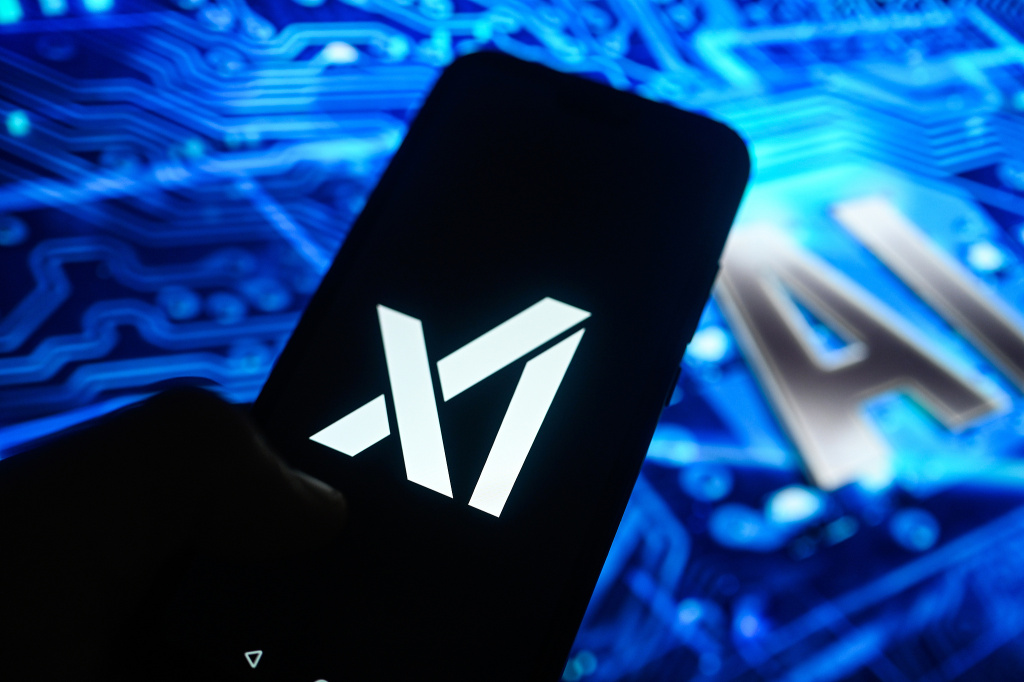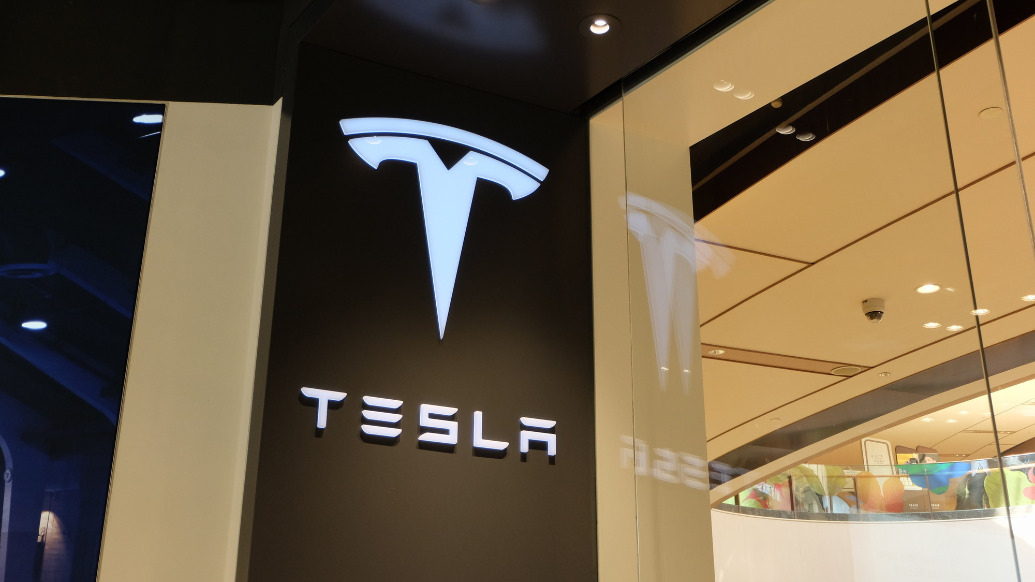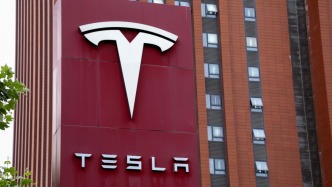
Elon Musk is actively directing important resources of his business empire, especially relying on Tesla's huge market value, to make strategic adjustments to its artificial intelligence startup xAI.
According to foreign media reports, the billionaire recently said that he plans to let Tesla shareholders vote on whether the electric car maker should invest in xAI, the artificial intelligence startup he founded two years ago, which is currently in the cash-burning stage. According to people familiar with the matter, not long ago, his rocket company SpaceX had agreed to invest about $2 billion in the artificial intelligence company.

An illustration shows the xAI logo on a smartphone with artificial intelligence (AI) symbols in the background in Poland on February 24, 2025, local time.
Musk has publicly stated that this move is intended to enable Tesla shareholders to share in the growth potential of xAI rather than seeking a merger of the two companies. However, this proposal comes at a time when Tesla itself is facing significant operating pressure, which not only highlights the company's current predicament, but also triggers a deep examination of potential strategic intentions, shareholder conflicts of interest, and long-term development paths.
Tesla, as a benchmark company in the global electric vehicle industry, has recently been experiencing severe challenges. The core automotive business has performed weakly, sales have shown a downward trend, the company's stock price has fallen by about 22% this year, and its market value has shrunk significantly.
Multiple factors have led to this situation: competition in the global electric vehicle market has intensified, especially in key markets such as China, where local brands have continued to squeeze market share through technological iteration and pricing strategies.
The controversial remarks made by the company's CEO, Elon Musk, on political issues have triggered negative reactions among certain consumer groups, putting pressure on the brand image and potential sales. At the same time, the delay in the advancement of the Robotaxi, a key technology project that has attracted much attention from the market, has weakened investors' confidence in the company's short-term technology delivery capabilities and the sustainability of its future growth engine. The weakening growth momentum of the core business has caused the market to doubt the sustainability of the basis for maintaining Tesla's high valuation.
On the financial level, Tesla's cash reserve advantage is also facing potential erosion risks. Although the company currently holds about $30 billion in cash and cash equivalents, if it follows SpaceX's example and invests billions of dollars in xAI, it will directly consume its considerable liquidity resources.
More importantly, the profit margin of Tesla's core automotive business has fallen to a relatively low level in history, only about 18%. Against the backdrop of pressure on the profitability of the main business and a tightening overall industry environment, investing huge amounts of capital in an artificial intelligence startup that is currently in a high loss phase and whose synergy with the existing core business is not yet clear will undoubtedly increase investors' concerns about Tesla's own financial stability and risk resistance. There is a reasonable question in the market: Will such an investment weaken Tesla's ability to cope with cyclical challenges in its core business?
Musk positioned Tesla's investment in xAI as an important opportunity for shareholders to participate in the high-growth field of artificial intelligence. After being incorporated into the social media platform X, xAI's valuation reached $113 billion, and its high growth expectations are attractive to Tesla, whose valuation is currently under pressure. However, evaluating the strategic value of this investment to Tesla requires careful consideration of its actual synergy effects. At present, the most direct integration point is that Tesla has integrated the Grok artificial intelligence assistant developed by xAI into its in-vehicle system, providing voice interaction functions and supporting personalized settings.
This move is intended to enhance product differentiation, but whether its actual user experience can effectively compete with or replace mature third-party in-vehicle systems (such as Apple CarPlay or Android Auto) and substantially drive sales growth still needs to be verified by the market.
Another potential direction of collaboration is the humanoid robot Optimus that Tesla is developing. In the future, it may be possible to integrate xAI's advanced models to enhance its cognitive decision-making capabilities, but this is a long-term vision with technological uncertainties.

On June 22, 2025, in Hangzhou, Zhejiang, visitors watched Tesla's humanoid robot "Optimus" at the robot exhibition.
From a deeper perspective, the push for Tesla to invest in highly valued xAI may reflect Musk's strategic considerations to reshape the company's growth narrative and hedge against downward pressure on the valuation of its electric vehicle business. By tying Tesla to the hot artificial intelligence assets, it aims to depict a new growth picture that integrates "technology and AI."
However, as Seth Goldstein, senior equity analyst at Morningstar, pointed out, if it is not possible to clearly demonstrate that xAI's technology has substantial and irreplaceable synergistic value with Tesla's core artificial intelligence projects, such as the autonomous driving system FSD and the robotics business, then this investment will be a high-risk financial investment for Tesla rather than a deployment with a clear strategic necessity.
The external environment also adds complexity and uncertainty to Tesla's decision. In terms of regulatory risks, the US Federal Trade Commission (FTC) and other agencies are stepping up their scrutiny of related-party transactions of technology giants. The frequent large-scale capital flows between Musk's companies are likely to trigger antitrust reviews and questions about the compliance of related-party transactions.
After Musk recently received a new compensation package worth about $56 billion, regulators have become significantly more sensitive to his related-party transactions. Any formal investigation or legal proceedings will bring significant uncertainty and compliance costs to the company.
In terms of industry competition, xAI is participating in a highly capital-intensive and extremely competitive AI competition worldwide. Although its technology Grok 4 model has shown competitiveness in some benchmark tests, compared with leading companies such as OpenAI, Anthropic, and Google, xAI still has a significant gap in technology maturity, enterprise-level customer base, and developer community influence. The monthly investment of about US$1 billion required to maintain its competitiveness means that xAI needs to continue to obtain huge amounts of capital.
If Tesla becomes one of its major investors, it would be tantamount to deeply binding its own financial situation with a startup company that is in a high-intensity "burning money" state and facing fierce competitive pressure. It may bear the pressure of continued capital injection in the future, and the final return is highly uncertain.
Tesla shareholders' vote on investing in xAI is a major decision on the company's future strategic direction, and a key test of Musk's cross-enterprise collaboration model and personal leadership authority.

Elon Musk, owner of Tesla, SpaceX and Twitter, speaks at the "Viva Technology" exhibition in Paris, France, on June 16, 2023 local time.
If the investment is approved, Tesla will be more deeply integrated into Musk's vertical ecosystem of "global communications - artificial intelligence core - Tesla - energy business". This may create synergies and enhance the narrative in the long run, but the financial autonomy of the independent listed entity and the focus on the core automotive and energy businesses may be weakened.
If the investment is not approved, although it will help Tesla retain capital to address urgent challenges in its core business and may ease the governance concerns of some investors, this result may be interpreted by the market as a denial of Musk's grand strategic synergy vision, thereby weakening his leadership position.


